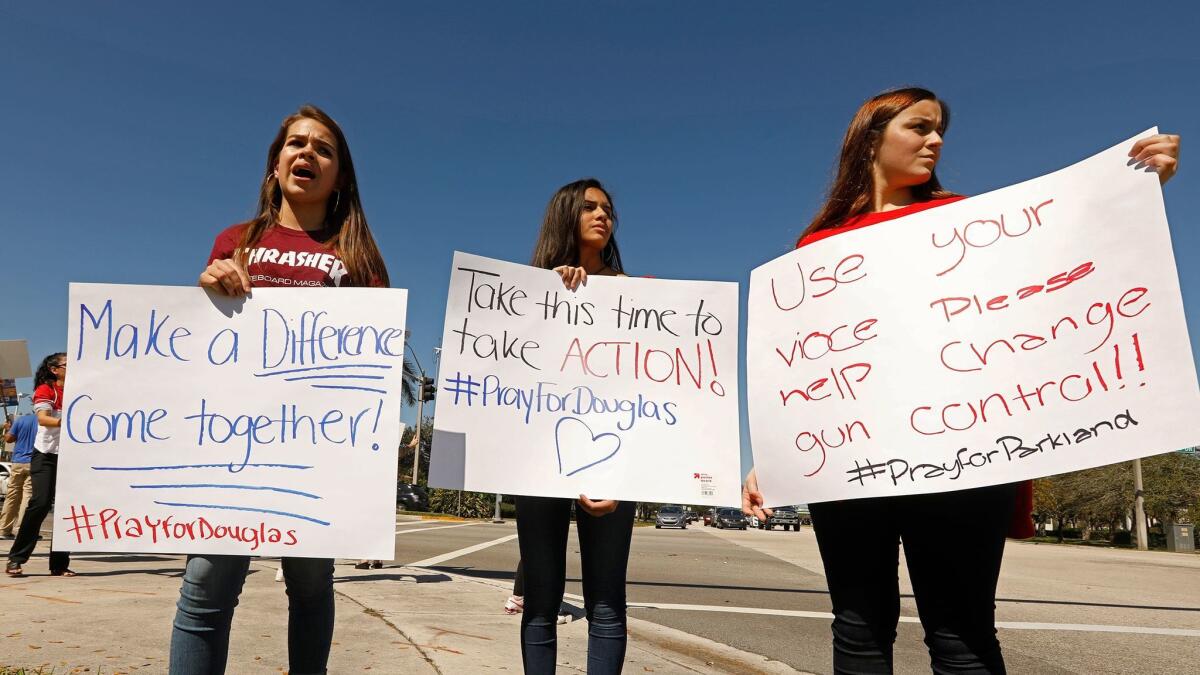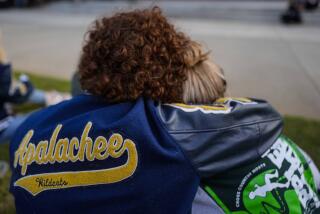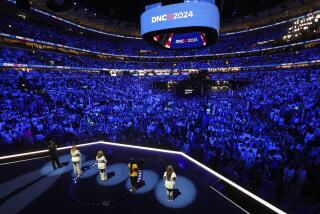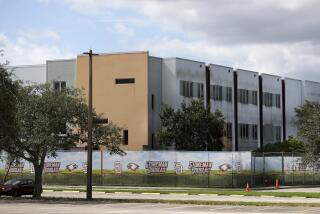Horrified Florida students beg the adults: Please, do something about guns

Reporting from Parkland, Fla. — The kids in South Florida are fed up. With the adults.
After a mass shooting left 17 students and faculty dead at Marjory Stoneman Douglas High School in the Fort Lauderdale suburb of Parkland, many area students — instead of withdrawing into the solitude of grief — have thrown themselves into the spotlight in anger and frustration.
They’re too young to vote. But in national TV interviews, in viral posts on social media, at protests outside schools, the students have chosen to make a noisy message clear to the politicians who represent them: They want stronger gun control.
“Stop apologizing. Get to work. Pass legislation that actually saves children’s lives,” Douglas junior David Hogg, 17, said Friday as he stood outside his school by police tape and pro-gun-control signs reading “Make school safe” and “Kids don’t need guns.”
The students speaking up this week are part of a post-Columbine generation that has grown up with school shootings in the news and an ever-present topic of discussion in their schools and homes.
Now that tragedy has come to them, they have lost all confidence in the ability of adults to protect them — a feeling reinforced by details that have emerged since the massacre.
The FBI revealed that over the last year it received two tips warning that suspect Nikolas Cruz, 19, might carry out a school shooting. But Cruz was never questioned.
The Broward County Sheriff’s Office said it had received 20 calls for service about Cruz in recent years, and Cruz was kicked out of school for disciplinary reasons.
But Cruz was still able to legally buy an AR-15 semi-automatic rifle after he turned 18. In the end, the school district’s preventative measures — which included safety monitors, on-campus police officers and school-shooting drills — were unable to prevent the massacre.
It’s not that the school wasn’t prepared, said Taylor Yon, a 16-year-old sophomore.
“We had been doing drills on this in the past month,” said Yon, who survived the shooting by crouching in a corner of her second-floor classroom, listening to gunshots and screams outside the door. “In every single class period, my teachers had gone through safety protocols. We have safety zones, we have protocols for every single emergency, and this thing still happened.”
Restricting guns seems to be the one thing the adults haven’t tried.
“I don’t understand how a 19-year-old who is obviously troubled and has all these problems is able to get a gun like that,” Yon said.
Hogg, who is student director of the school television station, was particularly upset with what he called President Trump’s “extremely hypocritical” comments following the shooting. Trump focused on mental health and on reporting disturbing behavior to the authorities.
“He didn’t even mention guns,” said Hogg, who hid in a classroom and interviewed other students about the shooting as they waited for police. “These are children’s lives being taken and nothing is being done. Now is the time for action. If our legislators don’t take action, how can we ever feel safe?”
After mass shootings, affected communities’ responses often reflect prevailing local politics. In more rural, conservative communities such as Sutherland Springs, Texas, and Roseburg, Ore., residents have generally been more skeptical that tighter gun controls would prevent mass shootings.
But in the 2016 presidential election, Broward County voters preferred Hillary Clinton to President Trump by more than 2 to 1. The teens’ calls for stronger gun control have been echoed by parents, the school district’s superintendent and the county sheriff.
“If you want to keep gun laws as they are now, you will not get reelected in Broward County,” Broward County Sheriff Scott Israel told a crowd of mourners at a Thursday night vigil.
Up the street from Douglas High School on Friday afternoon, a dozen protesters hoisted gun control signs and chanted “Use your voice, make a choice!” at passing traffic. Drivers honked in support.
“We don’t really have a voice in what’s going on,” said Isabella Cristancho, 14, who came to protest with two eighth-grade classmates from a nearby charter school. They plan to attend Douglas next year.
At South Broward High School about 20 miles away, dozens of students staged a walkout and chanted “We want safety!” and “Ban assault rifles!”
One sign said, “The Elementary students couldn’t protest — WE CAN,” a reference to the 2012 shooting massacre of 26 students and staff at Sandy Hook Elementary School in Newtown, Conn.
“It’s easier for a student to buy a gun than it is to get a lottery ticket or cigarettes or alcohol,” said Andrea Carroll, a 17-year-old junior, as a stream of passing vehicles honked.
One of junior Ariana Ali’s friends, Helena Ramsay, 17, was killed in the shooting, and Ali has turned her anger into activism. “It could have been avoided,” Ali, 17, said Friday. “Me and my friends are organizing a gun-violence protest in the city of Parkland right now.”
The group of friends have also called Parkland’s mayor, launched a hashtag — #NeverAgain — and gotten in touch with state legislators. “We are going to go to Tallahassee to talk about what we’ve seen,” Ali said.
As with every community, there are dissenters. Hannah Carbocci, a 17-year-old junior — who was in a Holocaust history class and who huddled under a desk as Cruz shot through the classroom door and wall — said she was not too concerned about restricting access to guns.
“People are always going to be able to get guns illegally,” Carbocci said. “I want higher security around the school. Better fences, metal detectors, gates at the main entrance.”
The responses by Florida’s U.S. senators have split across party lines, with Bill Nelson, a Democrat, calling to “get these assault weapons off our streets,” and Marco Rubio, a Republican, cautioning that “gun law alone won’t prevent mass shootings.”
Florida’s Republican governor, Rick Scott, has been noncommittal about possible gun restrictions, saying “everything’s on the table” and focusing his harshest criticism on the FBI, calling on the agency’s director to resign for missing the warning signs about Cruz.
Emilie Smith, a senior who goes to school 10 minutes away from Marjory Stoneman Douglas High School, and who had friends who survived the shooting, was deeply pessimistic about the nation’s political status quo.
“I’ve seen these shootings happen my whole life. I’ve grown up with them. I remember Sandy Hook. I remember every single one,” Smith said in a phone interview as she and a friend were on their way to donate blood. “Every time, about a week or more later, I don’t see any more trending tweets, I don’t see anyone talking about it. It’s devastating.”
But now — with students’ protests and criticism of public officials — “it’s almost like the kids are trying to step in for the adults,” Smith said. “I don’t think children should have to bear that.”
Smith is 18 now, and she said her dad is going to take her to register to vote. Her friends are all turning 18 soon, too. “The next chance I get to vote in this state, I’m definitely going to do that,” Smith said. “We’re definitely all going to vote.”
Twitter: @mattdpearce
Twitter: @mollyhf
More to Read
Sign up for Essential California
The most important California stories and recommendations in your inbox every morning.
You may occasionally receive promotional content from the Los Angeles Times.












